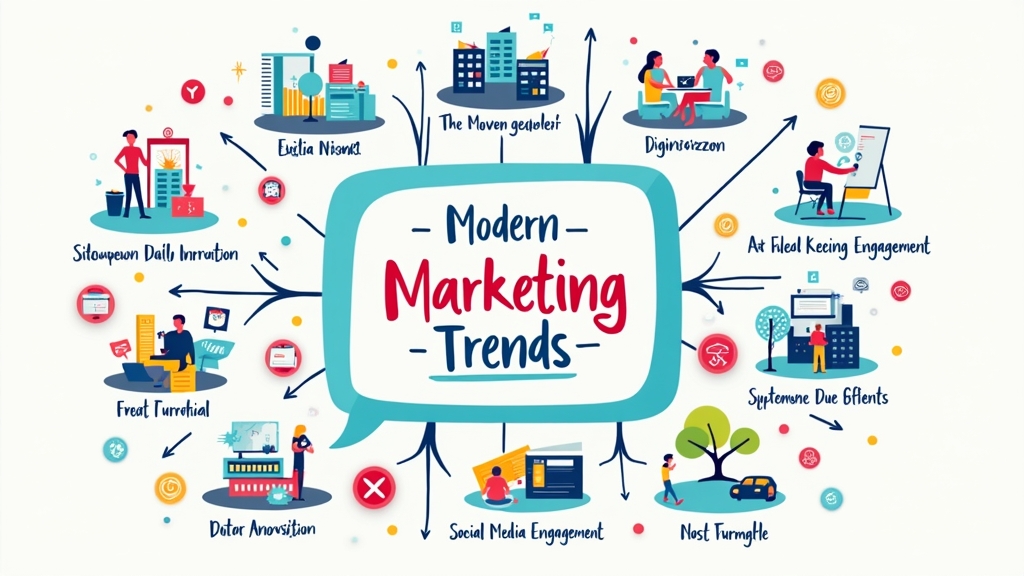Marketing Trends Analysis: Understanding the Future of Marketing Strategies
Introduction
Staying updated with marketing trends is crucial for any business aiming to thrive in today’s fast-paced environment. As consumer behavior evolves, so do the strategies that businesses must adopt to engage their audiences effectively. By understanding these trends, you can shape your marketing strategy to meet customer expectations and stay ahead of competitors. This article dives into current marketing trends, how they influence business strategies, and what you should watch for in the future.
Current Marketing Trends to Watch
Digital Transformation in Marketing
Digital transformation is reshaping how businesses approach marketing. The rise of artificial intelligence (AI) and machine learning has made it easier for marketers to analyze vast amounts of data quickly. These technologies enable personalized advertising by predicting consumer preferences based on past behaviors. For example, AI can help create targeted ads that resonate more with specific audiences, increasing engagement rates significantly.
Moreover, automation tools powered by AI streamline various marketing processes, from email campaigns to social media management. This efficiency allows marketers to focus on creative aspects while ensuring their strategies are data-driven and effective.
Personalization and Customization
Personalization is no longer just a trend; it’s a necessity in modern marketing. Consumers expect tailored messages that speak directly to their needs and preferences. Brands that invest in customization often see higher conversion rates because customers feel valued when they receive relevant content.
For instance, companies like Amazon use algorithms to suggest products based on previous purchases or browsing history. This level of personalization not only enhances user experience but also fosters brand loyalty as consumers are more likely to return when they feel understood.
The Role of Social Media in Modern Marketing
Emerging Platforms and Their Impact
Social media continues to evolve rapidly with new platforms emerging regularly. Apps like TikTok have gained immense popularity among younger demographics, offering unique opportunities for brands looking to connect with this audience creatively.
These platforms allow businesses to engage users through short-form videos or interactive content that captures attention quickly. As these new channels gain traction, traditional platforms like Facebook may shift focus towards integrating features appealing specifically for younger users.
Influencer Marketing Evolution
Influencer marketing has changed significantly over recent years. Initially dominated by celebrities with massive followings, the landscape now includes micro-influencers who have smaller but highly engaged audiences. These influencers often build trust through authenticity and relatable content.
Brands are increasingly partnering with these micro-influencers because they tend to yield higher engagement rates than traditional celebrity endorsements. Consumers appreciate genuine recommendations from people they relate to rather than polished advertisements from well-known figures.
Data-Driven Marketing Strategies
Importance of Analytics
Data analytics plays a pivotal role in shaping effective marketing decisions today. By analyzing consumer behavior patterns, businesses can identify which strategies work best and adjust their approaches accordingly.
For example, tracking website traffic helps marketers understand which pages attract visitors most frequently or where drop-offs occur during the purchasing process. This information allows them to optimize user experiences further and improve conversion rates effectively.
Privacy Regulations and Data Collection Challenges
As data collection becomes more sophisticated, privacy regulations such as GDPR (General Data Protection Regulation) and CCPA (California Consumer Privacy Act) present challenges for marketers seeking compliance while still gathering valuable insights about consumers.
Marketers must navigate these regulations carefully by implementing transparent data collection practices that respect user privacy rights without compromising the effectiveness of their campaigns.
Content Marketing Trends
Video Content Dominance
Video content remains one of the most powerful tools in digital marketing today due largely because it captures attention faster than text-based formats do—making it ideal for busy consumers who prefer quick information delivery over lengthy articles or posts.
Platforms like YouTube continue thriving as viewers flock toward engaging video tutorials or product reviews before making purchase decisions—showing why investing time into creating high-quality video content should be a priority for brands looking forward!
Interactive Content Engagement
Interactive content such as quizzes or polls engages users actively rather than passively consuming information alone—leading them deeper into brand narratives while enhancing overall user experience!
This type of engagement not only increases dwell time on websites but also encourages sharing among friends—creating organic reach opportunities beyond paid advertising efforts!
Sustainability and Ethical Marketing Practices
Consumer Demand for Social Responsibility
Today’s consumers prioritize sustainability more than ever before! They seek out brands demonstrating social responsibility through ethical practices—from sourcing materials sustainably down through fair labor policies throughout supply chains!
Understanding how sustainability affects brand loyalty is essential; companies committed genuinely towards environmental stewardship often cultivate stronger connections within target markets leading ultimately towards increased sales growth over time!
The Future Landscape: Predictions for Upcoming Years
Anticipated Changes in Consumer Behavior
Looking ahead at upcoming years reveals anticipated changes influenced heavily by shifting demographics! Younger generations place greater emphasis upon values aligning closely alongside personal beliefs—including sustainability efforts alongside inclusivity initiatives across industries alike!
Marketers need remain agile adapting swiftly towards evolving preferences ensuring relevance amidst changing landscapes driven primarily via technology advancements coupled alongside heightened awareness surrounding societal issues impacting everyday lives profoundly too!
Conclusion
In summary, adapting your marketing strategy according to current trends is vital for long-term success! From embracing digital transformation through AI innovations downwards toward prioritizing sustainable practices reflecting consumer values—the future holds exciting possibilities awaiting those willing embrace change proactively! Stay informed about emerging trends so you can position your business favorably within competitive markets effectively moving forward confidently together towards success ahead!
📢 Explore More: Continue Your Journey!
If this article helped you understand modern marketing better, check out “The Power of Video Content!” It covers why video remains an essential tool in engaging customers effectively.














![NEEWER 55W 18"/45cm Ring Light Kit [New Version], 5600K Dimmable ...](https://m.media-amazon.com/images/I/414QLqvZWLL._AC_.jpg)








